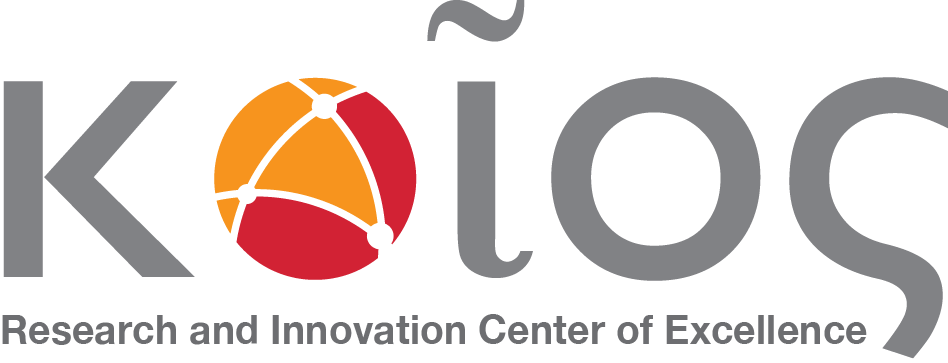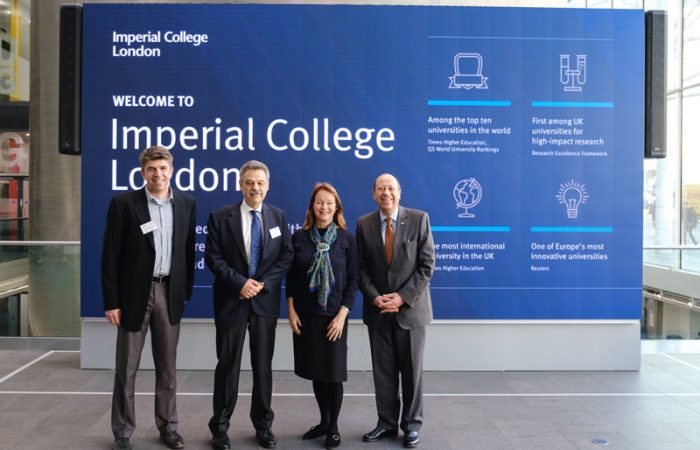The strategic partnership and the opportunities for research and study through the close collaboration between the University of Cyprus and Imperial College London was the focus of the event that was successfully organized by the Imperial College London and the High Commission of the Republic of Cyprus in the UK, on the 27th February 2019 in London.
The event entitled “Opportunities for Research and Study through Imperial College London – University of Cyprus Collaboration at the KIOS Research and Innovation Center of Excellence” was under the auspices of the High Commissioner of the Republic of Cyprus in the UK, H.E. Euripides L. Evriviades.
The President of Imperial College London, Professor Alice Gast and the High Commissioner of the Republic of Cyprus in the UK Euripides L. Evriviades opened the event by stressing the importance of this collaboration and the contribution of the EU in facilitating the collaboration through the KIOS Research and Innovation Center of Excellence Teaming project.
In her welcome address, President Gast highlighted the outcomes of the strategic partnership between University of Cyprus and Imperial College London, mentioning the already large number of Cypriot undergraduate and graduate students studying at Imperial while Imperial and Cyprus collaborate in several research projects and have more than 900 joint publications over the past five years.
She emphasized that these outcomes will further increase due to this strategic collaboration between the two institutions. She placed particular emphasis on the importance of the scientific areas of the KIOS CoE and its relevance to the future critical infrastructure systems. Furthermore, she encouraged students and young researchers to take advantage of the education and mobility opportunities offered by the Teaming project, one of these being the new collaborative MSc program on Intelligent Critical Infrastructure Systems which will start in September 2019.
In his welcome address, the High Commissioner thanked Imperial for this strategic collaboration and for sharing their experience, expertise, and best practices which will also have an impact in changing the research and innovation culture of Cyprus. Saying that “KIOS epitomizes the growing relationship between the UK and Cyprus in research”, he furthermore highlighted the impact that the research focus of KIOS CoE will have on future smart cities.
The Deputy Directors of the KIOS CoE, Professor Christos Panayiotou, representing the University of Cyprus, and Professor Thomas Parisini, representing Imperial College London, presented the KIOS CoE strategic partnership and the opportunities for joint research and study offered by the two institutions. In addition, researchers from both institutions gave brief presentations on the research focus of the KIOS CoE and addressed some of the challenges faced by critical infrastructure systems such as power systems, water distribution networks and intelligent transportation systems while emphasizing the emerging importance of cyber-security in these infrastructures.
The event highlighted the importance of the KIOS CoE project which has created new opportunities for researchers in Cyprus and the UK to share experience and expertise, produce joint publications as well as participate in collaborative projects. Furthermore, this collaboration has initiated new educational activities including the new MSc program in Intelligent Critical Infrastructure Systems which will be offered at the University of Cyprus by leading academics from Imperial and the University of Cyprus. The objective of this internationally unique and multidisciplinary program is to teach highly innovative and intelligent system methods and tools from emerging Information and Communication Technologies (ICT), for the purpose of tackling challenging problems such as monitoring, control, management and security in critical infrastructure systems. The program will start in September 2019 and is currently accepting applications for student enrolment.
The event was open to the public and attracted more than 100 participants. It included presentations and a poster session with demonstrations by researchers of the Center.



